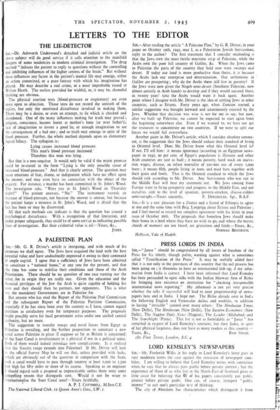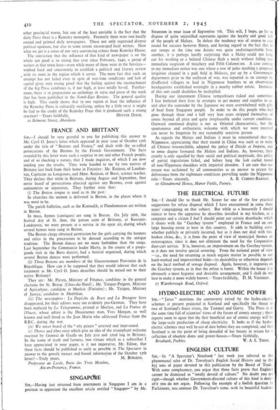LORD KEMSLEY'S NEWSPAPERS
SIR,—Mr. Frederick Willis in his reply to Lord Kemsley's letter puts in very moderate terms the case against the extension of newspaper com- bines. I am willing to believe that Lord Kemsley writes with conviction when he says that he always puts public before private interest ; but the experience of those of us who live in the North-East of Scotland gives us little cause for believing that ill of his papers consistently put public interest before private profit. One can, of course, interpret " public interest " to suit one's particular wzy of thinking.
The city of Aberdeen has characteristics which distinguish it from other provincial towns, but one of the least enviable is the fact that the daily Press there is a Kemsley monopoly. Formerly there were two locally owned and printed daily newspapers. These not only expressed diverse political opinions, but also to some extent encouraged local writers. Now what we get is a series of not very convincing echoes from Kemsley House.
The conviction that the influence of that kind of newspaper is on the whole not good is so strong that ever since February, 1940, a group of writers in that town have—even while many of them were in the Services— worked hard and consistently to establish a political and literary review with its roots in the region which it serves The mere fact that such an attempt has not failed even in spite of war-time conditions and lack of capital gives very strong proof that the feeling against the encroachment of the big Press combines is, if not high, at least solidly bated. Further- more, there is in preparation an anthology in verse and prose of the work that has been published in the North-East Review. The general quality is high. This surely shows that in one region at least the influence of the Kemsley Press is culturally sterilising, unless by a little twist it might be laid to the credit of the Kemsley Press that it produced such a strong































 Previous page
Previous page